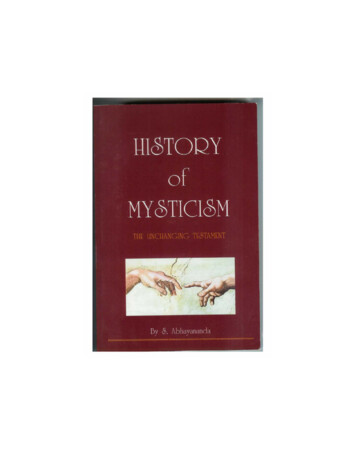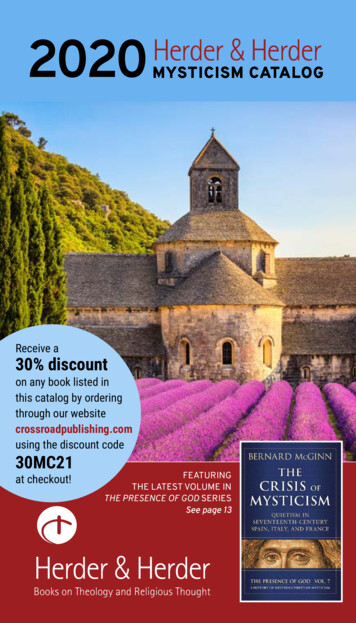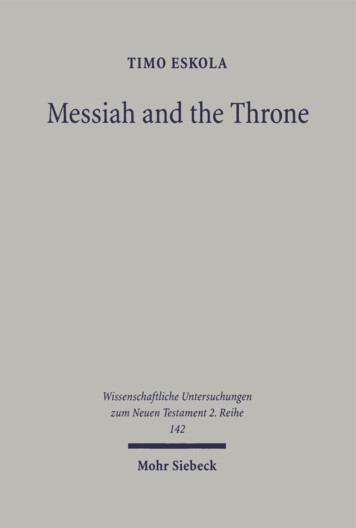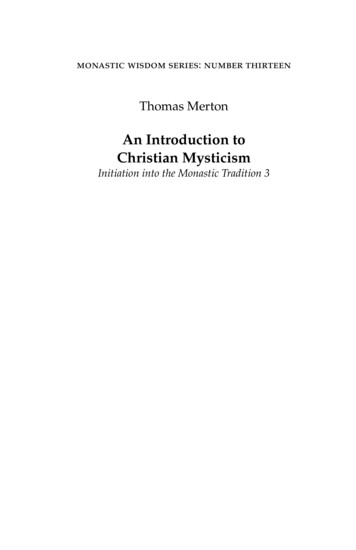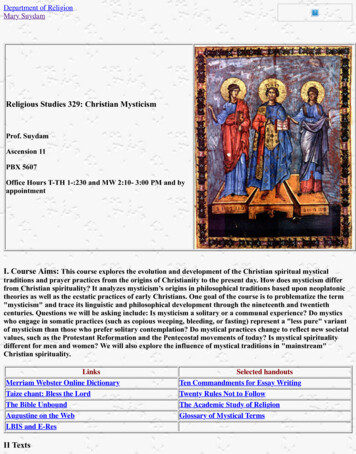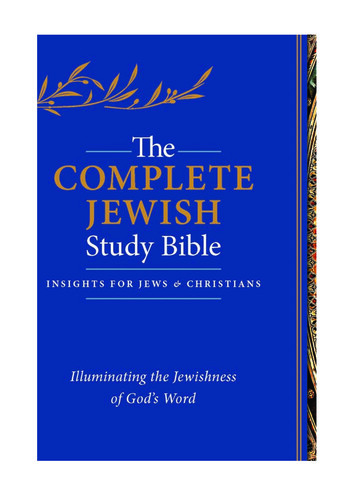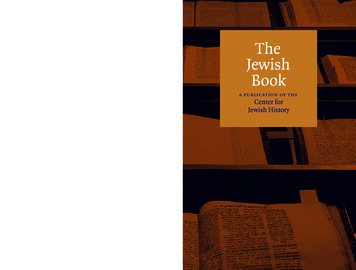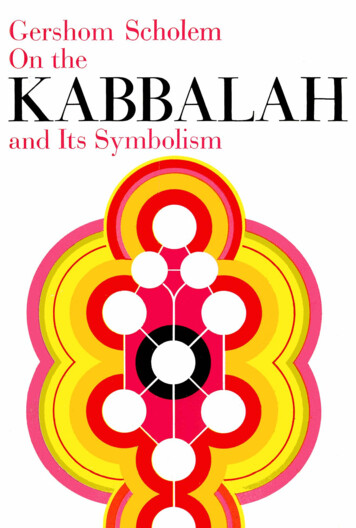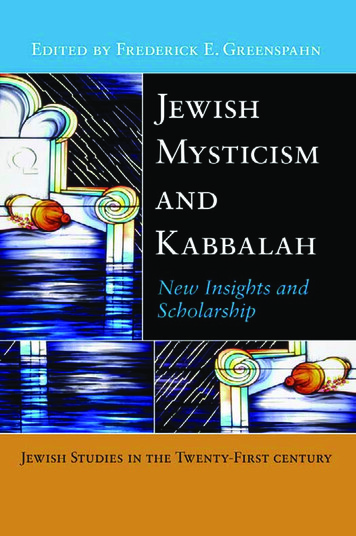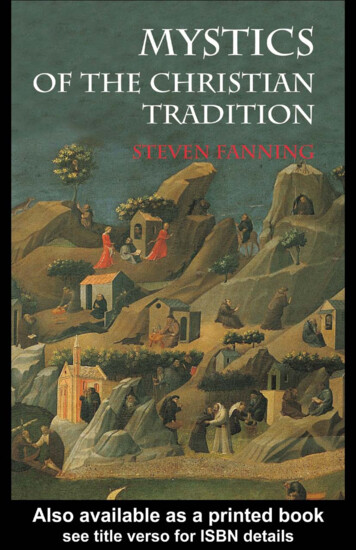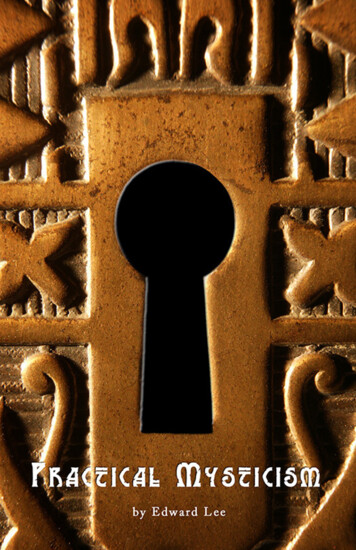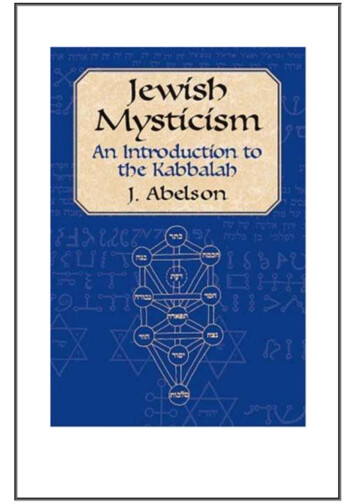
Transcription
JewishMysticismAn introductionto the kabbalahbyJ. AbelsonLondon: G. Bell and Sons[1913]
Jewish Mysticism By J. Abelson. This web edition publishedby Global Grey 2012.This work is licensed under a Creative Commons Licence. You arefree: to copy, distribute, display, and perform the work, and tomake derivative works under the following conditions: you mustattribute the work in the manner specified by the licensor; youmay not use this work for commercial purposes; if you alter,transform, or build upon this work, you may distribute theresulting work only under a license identical to this one. For anyreuse or distribution, you must make clear to others the licenseterms of this work. Any of these conditions can be waived if youget permission from the licensor. Your fair use and other rightsare in no way affected by the above.GLOBAL GREYNOTHING BUT E-BOOKS
TABLE OF CONTENTSEDITOR'S PREFACEPREFACEINTRODUCTIONI. SOME EARLY ELEMENTS: ESSENISMII. THE MERKABAH (CHARIOT) MYSTICISMIII. PHILO: METATRON: WISDOMIV. KINGDOM OF HEAVEN: FELLOWSHIP: SHECHINAHV. THE BOOK 'YETSIRAH'VI. SOME GENERAL FEATURES OF THE 'ZOHAR' MYSTICISMVII. THE TEN SEFIROTVIII. THE SOULCONCLUDING NOTEBIBLIOGRAPHY
1Jewish Mysticism By J. AbelsonEDITOR'S PREFACEGENERAL and special studies on Christian mysticism are numerous enough; but it issomewhat remarkable that, in their introductory pages, authors, who have much to sayof Plotinus and Neoplatonism, have nothing or very little on the still more cognatesubject of Jewish mysticism. This is not, however, so very surprising, for, truth to tell,there is a singular dearth of anything like an adequate introduction to the study ofJewish mysticism itself. The impression left with the general reader is that there is littleof a mystical nature in the legitimate tradition of Jewish religion, and that the Kabbalahis simply a morbid and late growth, fed entirely by elements foreign to the genius ofIsrael. How ill founded is the former view, and how extreme the latter, may be seen inthe following pages. In an able summary, that may well serve as an introduction to thegeneral study of Jewish mysticism, Dr. Abelson makes accessible to the general reader,in simple terms, the results of his careful inquiry, based on the researches of the bestJewish scholars, and reinforced by his own wide acquaintance with Talmudic andRabbinical literature. To write profitably on Jewish mysticism, it is necessary to have,not only a discriminating sympathy with the mystical standpoint, but also a first-handknowledge of Jewish religious literature, the peculiar genius of which, perhaps, no onebut a member of the race that has produced it can adequately appreciate and interpret.In addition to this, Dr. Abelson comes well prepared for his task, as he has alreadyopened up a new field of research by his valuable critical study on The Immanence ofGod in Rabbinical Literature, a subject which is the indispensable presupposition of allJewish mysticism.www.globalgrey.co.uk
2Jewish Mysticism By J. AbelsonPREFACETHE following pages are designed to give the reader a bird's-eye view of the salientfeatures in Jewish mysticism rather than a solid presentation of the subject as a whole.The reason for this will be apparent when one thinks of the many centuries ofvariegated thought that have had to be packed within the small number of pagesallotted to the book. It is this very fact, too, that will possibly give the present treatmentof the subject a fragmentary and tentative appearance. Thus Chapter V. followsimmediately upon the contents of Chapter IV., without the least attempt to show any ofthe numerous intervening stages of development. Similarly, Chapter VI., dealing withthe Zohar, should have been preceded by an exposition of the evolution of Jewishtheological thought in the many centuries which divide that chapter from the mattercontained in the previous chapter. But lack of space made these omissions inevitable.Should the reader be stimulated to a deeper study of the subject, he will be easily led tothe missing parts by the aid of the bibliography at the end of the book. I should add thatthe translated extracts from the Zohar are only in some cases made by me from theoriginal Hebrew-Aramaic. I owe many of them to the French and German translations tobe found in the works of the scholars from whom I have drawn much of my material.J. ABELSON.ARIA COLLEGE, PORTSMOUTH.www.globalgrey.co.uk
3Jewish Mysticism By J. AbelsonINTRODUCTIONIT might strike the average reader as exceedingly odd that any attempt should be madeat writing a book on Jewish mysticism. The prevailing opinion—among theologians aswell as in the mind of the ordinary man--seems to be that Judaism and mysticism standat the opposite poles of thought, and that, therefore, such a phrase as Jewish mysticismis a glaring and indefensible contradiction in terms. It is to be hoped that the contents ofthis little book will show the utter falsity of this view.What is this view, in the main, based upon? It is based upon the gratuitous assumptionthat the Old Testament, and all the theological and religious literature produced by Jewsin subsequent ages, as well as the general synagogue ritual, the public and privatereligious worship of the Jew--that all these are grounded on the unquestioningassumption of an exclusively transcendent God. The Jews, it is said, never got any higherthan the notion of the old Jehovah whose abode was in the highest of the seven heavensand whose existence, although very very real to the Jew, was yet of a kind soimmeasurably far away from the scenes of earth that it could not possibly have thatsignificance for the Jew which the God of Christianity has for the Christian. The Jew, it issaid, could not possibly have that inward experience of God which was made possible tothe Christian by the life of Jesus and the teaching of Paul.This is one erroneous assumption. A second is the following: The Pauline antithesis oflaw and faith has falsely stamped Judaism as a religion of unrelieved legalism; andmysticism is the irreconcileable enemy of legalism. The God of the Jew, it is said, is alawgiver pure and simple. The loyal and conscientious Jew is he who lives in the throesof an uninterrupted obedience to a string of laws which hedge him round on all sides.Religion is thus a mere outward mechanical and burdensome routine. It is one longbondage to a Master whom no one has at any time seen or experienced. All spirituality iswanting. God is, as it were, a fixture, static. He never goes out of His impenetrableisolation. Hence He can have no bond of union with any one here below. Hence, further,He must be a stranger to the idea of Love. There can be no such thing as aselfmanifestation of a loving God, no movement of the Divine Spirit towards the humanspirit and no return movement of the human spirit to the Divine Spirit. There can be nofellowship with God, no opportunity for any immediate experiences by which thehuman soul comes to partake of God, no incoming of God into human life. And wherethere is none of these, there can be no mystical element.A third false factor in the judgment of Christian theologians upon Judaism is theirinsistence upon the fact that the intense and uncompromising national character ofJudaism must of necessity be fatal to the mystical temperament. Mystical religion does,of course, transcend all the barriers which separate race from race and religion fromreligion. The mystic is a cosmopolitan, and, to him, the differences between thedemands and beliefs and observances of one creed and those of another are entirelyobliterated in his one all-absorbing and all-overshadowing passion for union withReality. It is therefore quite true that if Judaism demands of its devotees that theyshould shut up their God in one sequestered, watertight compartment, it cannot at thesame time be favourable to the quest pursued by the mystic.www.globalgrey.co.uk
4Jewish Mysticism By J. AbelsonBut as against this, it must be urged that Judaism in its evolution through the centurieshas not been so hopelessly particularist as is customarily imagined. The message of theOld Testament on this head must be judged by the condition of things prevailing in thelong epoch of its composition. The message of the Rabbinical literature and of much ofthe Jewish mediæval literature must similarly be judged. The Jew was the butt of theworld's scorn. He was outcast, degraded, incapacitated, denied ever so many of theinnocent joys and advantages which are the rightful heritage of all the children of men,no matter what their distinctive race or creed might be. He retaliated by declaring (as aresult of conviction), in his literature and in his liturgy, that his God could not, by anychance, be the God of the authors of all these acts of wickedness and treachery. Idolatry,immorality, impurity, murder, persecution, hatred—the workers of all these mustperforce be shut out from the Divine presence. Hence seeing that, in the sight of the Jew,the nations were the personification of these detestable vices, and seeing that the Jew, inall the pride of a long tradition, looked upon himself as invested with a spirit of especialsanctity, as entrusted with the mission of a holy and pure priesthood, one can quiteeasily understand how he came to regard the God of Truth and Mercy as first andforemost his God and no one else's.But with all this, there are, in all branches of Jewish literature, gleams of a far wider,more tolerant, and universalist outlook. In-stances will be quoted later. The fact thatthey existed shows that the germs of the universalism implied in mysticism were there,only they were crushed by the dead-weight of a perverse worldly fate. The Jew certainlydid, and could, find God in his neighbour (a non- Jew) as well as in himself. And thisability is, and always was, a strong point of the mystics. Further, even if it be grantedthat there are in Judaism elements of a nationalism which can hardly be made to squarewith a high spirituality, this is no necessary bar to its possession of abiding and deeplyingrained mystical elements. Nationalism is an integral and vital part of the Judaism ofthe Old Testament and the Rabbinical literature. It is bone of its bone, spirit of its spirit.It is so interfused with religion that it is itself religion. You cannot take up the oldJudaism and break it up into pieces, saying: Here are its religious elements; there are itsnational elements. The two are inextricably combined, warp and woof of one texture.And thus it came about that--strange as it may appear to the modern mind--a halo ofreligious worth and of strong spirituality was thrown over beliefs and practices which,considered in and for themselves, are nothing more than national sentiments, nationalmemories, and national aspirations. Such, then, being the case, the relation of Judaism toJewish nationalism is the relation of a large circle to the smaller circle inscribed withinit. The larger embraces the smaller.To come now to mysticism; the mystic differs from the ordinary religionist in thatwhereas the latter knows God through an objective revelation whether in nature or asembodied in the Bible (which is really only second-hand knowledge, mediate, external,the record of other people's visions and experiences), the mystic knows God by contactof spirit with spirit; cor ad cor loquitur. He has the immediate vision; he hears the stillsmall voice speaking clearly to him in the silence of his soul. In this sense the mysticstands quite outside the field of all the great religions of the world. Religion for him ismerely his own individual religion, his own lonely, isolated quest for truth. He issolitary--a soul alone with God.But when we examine the lives and works of mystics, what do we usually find? Weusually find that in spite of the intensely individualistic type of their religion, they arewww.globalgrey.co.uk
5Jewish Mysticism By J. Abelsonallied with some one particular religion of the world's religions. Their mysticalexperiences are coloured and moulded by some one dominant faith. The specific formsof their conceptions of God do not come from their own inner light only, but from theteachings which they imbibe from the external and traditional religion of their race orcountry. Thus, Christian mysticism has characteristics which are sui generis; so hasMohammedan mysticism; so has Hindu mysticism; and likewise Jewish mysticism. Themethod, the temperament, the spirit are very much the same in all of them. But theinfluence wielded over them by the nature and trend of each of the great dominantreligions is a decisive one, and stamps its features on them in a degree which makesthem most easily distinguishable from one another. Thus Judaism, whatever be itscomposition or spiritual outlook, can certainly be a religion of mysticism. Its mysticismmay be of a different order from that which we commonly expect. But this we shall seeinto later.I have thus far dealt with the misconstructions put upon Judaism and its mysticism bytheologians outside the Jewish fold. I must now say something about the erroneousjudgments passed upon the subject by some Jewish theologians. Jewish mysticism is asold as the Old Testament--nay, as old as some of the oldest parts of the Old Testament. Itprevailed in varying degrees of intensity throughout the centuries comprised in the OldTestament history. The current flowed on, uninterrupted, into the era covered by theRabbinic period. The religious and philosophical literature, ritual, worship, of Jewishmediævalism became heirs to it, developing and ramifying its teachings andimplications in ways which it is the purport of this book partially to tell.Now, more than one Jewish writer has categorically asserted that the origins of Jewishmysticism date back not, as is the fact, to the mists of antiquity, but to the period ofEuropean-Jewish history beginning with the 12th century. The German-Jewishhistorian, H. Graetz (1817-1891), one of the best-known upholders of this view, ascribesthe origin of Jewish mysticism to a French Rabbi of the 12th and 13th centuries, byname Isaac ben Abraham of Posquières, more generally known as Isaac the Blind. Heregards him as the father 'of the Kabbalah'--the latter term being the general name inJewish literature for every kind or school of mystical interpretation. Isaac is the reputedauthor of the Hebrew mystical treatise written in dialogue form and called Bahir('Brightness')--the book which, more than all its predecessors in this domain,anticipates the style and contents of the Zohar ('Shining'), which is par excellence themediæval textbook of Jewish mysticism, and belongs to the 14th century. Graetz regardsthe appearance of this mysticism as some sudden, unexplained importation fromwithout, a plant of exotic origin, "a false doctrine which, although new, styled itself aprimitive inspiration; although un-Jewish, called itself a genuine teaching of Israel"(History of the Jews, English Trans., vol. iii. p. 565).But a perusal of the Old Testament, the New Testament (much of which is Hebraic inthought and the work of Jews), and the Rabbinic records will not, for one moment, lendcountenance to such a theory. It is in these early monuments of Judaism that the originswill be found. Of course, in saying that the Old Testament holds elements of mysticism-and in saying the same thing of the New Testament--it must be understood that themysticism is of an implicit and unconscious kind and not the type of religion historicallyknown as 'mysticism.' It is ever so far removed from the mysticism of a Plotinus or anEckhart or an Isaac Luria (Jewish mystic, 1533-1572). But taking mysticism in itsbroader connotation as meaning religion in its most acute, intense, and living stagewww.globalgrey.co.uk
6Jewish Mysticism By J. Abelson(Rufus Jones, Studies in Mystical Religion, p. xv.), an immediate and first-hand experienceof God, then the ascription of mysticism to the Old and New Testaments is perfectlycorrect. And, as will be obvious from our coming pages, the most highly-elaboratedmystical doctrines of Jews in all ages subsequent to the Old Testament are, afterallowing for certain extraneous additions, an offshoot of the latter's teachings.Another type of ill-considered and unjust judgment often passed on Jewish mysticismby Jewish authorities, is to be found in the sneering and condemnatory attitude theyadopt towards it in their writings. This, of course, is a phenomenon by no meansconfined to Jews. One need only think of the hostility of men like Ritschl, Nordau, andHarnack towards all mysticism, indiscriminately. The antagonism springs, in all cases,from an inability to appreciate the subjectivity and individualism of the mysticaltemperament. While rationalism attempts to solve the ultimate problems of existenceby the application of the intellect and the imagination, mysticism takes account of thecravings of the heart and of the great fact of the soul. Pure philosophy will never avail togive the final answer to the questions, "what is above, what is below, what is in front,what is behind" (Mishna, Ḥaggigah, ii. 1). The world, to man's pure intellect, consistsonly of that which is seen and which is temporal. But there is an-other worldtranscending it, a world invisible, incomprehensible, but yet both visible andcomprehensible to the soul's craving for communion with the Divine. No ratiocination,no syllogism of logic, can strip off the veil from this elusive world.The pathway to it lies through something quite other than intellectuality or senseexperience. It can be grasped only by those inward indefinable movements of feeling oremotion which, in their totality, constitute the soul.From all this it follows that scholars who, whether congenitally or by mental training,have no sympathy with the subjectivity of the emotions, should be incapable ofappreciating the paraphernalia of mysticism.But in the case of Jewish theologians there is something more to be said. As will be seenin the course of our coming pages, mystical speculation among the Jews clusteredlargely round the cosmological sections of the Bible. This is true of the earlier as well asof the later mysticism. It is to be found in the Enoch literature, a product of the first preChristian century (see Charles, The Book of the Secrets of Enoch, 1896, p. xxv.), as well asin the Kabbalistic works produced in France, Spain, Germany, and Poland from the 12thto the 18th century. Combined with this cosmological speculation--or rather as anoutcome of it--there went an anthropomorphism which cannot be described otherwisethan as being gross. And, in addition to this, a mysterious power was ascribed to thepermutations and combinations of the letters of the Hebrew alphabet. By some of themost extraordinary feats of verbal jugglery these letters are made to prove all sorts ofthings in heaven and earth. They are purely fantastic, and no one can possibly take themseriously. The treatment of the question of the soul, too, gave rise to many curiousbeliefs about the transmigration of the soul and the appearance of the soul of theMessiah.All these aspects of Jewish mysticism, tainted as they undoubtedly are by many unlovelycharacteristics, have been eagerly seized upon by the critics in order to show theunedifying nature of the whole teaching. But it is really an unfair criticism, seeing that itleaves totally out of account the preponderating mass of true poetry and spiritualitywww.globalgrey.co.uk
7Jewish Mysticism By J. Abelsonwhich inhere in all parts of Jewish mystical speculation. We shall have occasion to givemany illustrations of this statement in pages to follow. Nowhere in Jewish literature isthe idea of prayer raised to such a pitch of sublimity as it is in the lives and writings ofthe Jewish mystics. If it is true to say that Judaism here and there suffers from too largean element of formalism and legalism and externalism, it is equally true to say thatmany of these drawbacks are corrected, toned down, by the contributions of mysticism.And although its treatment of the soul is in many ways overwrought and farfetched, it isgood to know that there is a side of Judaism which laid stress not only on theimportance of our securing happiness or reward in this earthly life but also in the lifebeyond. Jewish mysticism can congratulate itself in having, at one momentous epoch ofJewish history, achieved for Judaism a boon, which Christian mysticism in quite anotherway, but in an equally important degree, achieved for Christianity. Systematic Christianmysticism began in the late 14th and early 15th centuries. Its foremost exponent wasMeister Eckhart, the Dominican monk. What Eckhart and his followers achieved may besummarised by saying that they relieved Christendom of the heavy load of aridscholasticism under which it had for long been oppressed, and, by introducing ideas ofreligion at once more simple, more practical, more social, and more spiritual, paved theway for the New Learning--for the new discoveries in science and philosophy whichwere to revolutionise the world. In other words, this Christian mysticism was theavenue through which the subtle dark speculations of an Albertus Magnus and aThomas Aquinas had necessarily to pass in order to prepare coming ages for the light ofa Newton, a Kant, and a Darwin. Hence must modern science come down from thepedestal of her pomp and glory, and bow her acknowledgments to the services of manya humble Christian mystic.Jewish mysticism has a similar act of homage to receive at the hands of every lover ofJewish scholarship. In the 13th century Judaism was in danger of becoming devitalisedthrough the theology of Moses Maimonides--the great Spanish-Jewish theologian andauthor of the famous Guide of the Perplexed-- who looked upon reason as the finalarbiter of the rightness or wrongness of any Jewish dogma. Judaism for him was a cult ofthe intellect and the intellect only. The sole representative of the intellect was Aristotle.Nearly everything in Judaism had by hook or by crook to be harmonised with the tenetsof Aristotelianism. Thus, Jewish morality must, to have validity, be shown to be inconsonance with Aristotle's four faculties of the soul and with his theories of 'the mean.'Judaism's teachings on the unity of God must be brought into line with the Aristotelianindivisible God, who is the principal of all essences, the disposer of the world. Just asintellectual perfection is, to the Greek philosopher, the highest aim of man, so must theteachings of Judaism be interpreted in such a way as to show that, according to theTorah, the life of the saint is a life of the highest intellectuality. Revelation--which is oneof the cornerstones of the Jewish faith--must be in accordance with reason. All thetruths enunciated by Plato and Aristotle are anticipated in the writings of the Prophetsand of some of the Talmudic sages. The prophets, according to Maimonides, were therecipients, orally, of a set of philosophical doctrines which were handed on orally fromfather to son, from generation to generation, until the age of the Talmud. Philosophy isan echo of them. What a fossilising, deteriorating effect the spread of these teachingsmust have wielded upon Judaism had they been allowed to go on without check!The check came in the shape of mysticism. It corrected the balance. It showed thatJudaism was a religion of the feelings as well as of the intellect. It showed that the Jew'swww.globalgrey.co.uk
8Jewish Mysticism By J. Abelsoneternal quest was not to be right with Aristotle but to be right with God. It showed thatJudaism has a place not only for Reason but for Love too. It showed that the ideal life ofthe Jew was, not a life of outward harmony with rules and prescriptions, but a life ofinward attachment to a Divine Life which is immanent everywhere, and that the crownand consummation of all effort consists in finding a direct way to the actual presence ofGod.www.globalgrey.co.uk
9Jewish Mysticism By J. AbelsonI. SOME EARLY ELEMENTS: ESSENISMTHE Old Testament is the fountain-head of Judaism. Hence if it is true, as is contended ina previous page, that the Old Testament contains mystical elements, then the startingpoint in any treatment of Jewish mysticism on historical, or even semi-historical, linesmust be the Old Testament. But this course will not be adopted here. The Old Testamentwill be omitted. And for a reason which has already been hinted. The mysticism of theOld Testament is of an elementary, naïve, and unconscious kind, whereas what thisbook is intended to show is the consciously-elaborated, professional mysticism of theJews. What we get in the Old Testament are the ground-work and the scaffolding, theindispensable beginnings of the edifice; but not the edifice itself.Thus it has much to say about the Fatherhood of God. Here we have a basic conceptionof all mysticism; for the latter in all its phases and stages assumes the possibility ofcommunion with some one who, while greater and more powerful than ourselves, is atthe same time loving, and benevolent, and personally interested in us. You can only prayto one who hears; you can only feel love towards one who, you know, has loved youfirst. The Old Testament scintillates with sublime examples of men whose communionwith God was a thing of intensest reality to them, and whose conviction of the 'nearness'of the Divine was beyond the slightest cavil. The sudden and unexpected inrushes ofDivine inspiration which seized the Old Testament prophets; Isaiah's vision of a God'whose train filled the Temple'--an emblem of the All-inclusiveness of Deity, of thepresence and the working of an all-embracing Spirit of Life; the ecstasy of an Ezekiellifted from off his feet by the Spirit and removed from one place to another; the fact ofprophecy itself--the possession of a spiritual endowment not vouchsafed to ordinarymen, the endowment of a higher insight into the will of God;--all these represent a stageof first-hand, living religion to which the name of mysticism is rightly and properlyapplied. But they are no more than the preamble to the explicit, conscious, andpronouncedly personal type of Jewish mysticism which is the subject of the presentbook.The earliest beginnings of this mysticism are usually accredited, by modern Jewishscholars, to the Essenes. To say this, is to put back Jewish mysticism to a very early date,for according to the theory of Wellhausen (Israëlitische and jüdische Geschichte, 1894, p.261), the Essenes as well as the Pharisees were offshoots of the Ḥasidim ( ' ידיסח piousones') of the pre-Maccabean age. But it is only a theory, and not an established historicalfact, seeing that the religious tenets of the Jews during the three centuries immediatelypreceding the birth of Christianity are veiled in considerable obscurity, and seeing alsothat the real meaning of the name 'Essenes' as well as their exact relations with thePharisees are points upon which there is anything but certainty. 'What is certain,however, is that three out-standing literary sources belonging to the first two or threeChristian centuries--viz. (a) Philo, (b) Josephus, (c) some older portions of theBabylonian and Palestinian Talmuds--all have stray allusions, couched in varyingphraseology, to certain sects or parties who differed in their mode of life from thegeneral body of the Jews, and who were in possession of certain esoteric teachings ofwhich those outside their ranks were un-informed.Thus Philo (Quod omnis probes liber, 12) writes of them that they were "eminentlyworshippers of God (θεραπευταὶ θεοῦ), not in the sense that they sacrifice livingwww.globalgrey.co.uk
10Jewish Mysticism By J. Abelsonanimals (like the priests in the Temple), but that they are anxious to keep their minds ina priestly state of holiness. They prefer to live in villages, and avoid cities on account ofthe habitual wickedness of those who in-habit them, knowing, as they do, that just asfoul air breeds disease, so there is danger of contracting an incurable disease of the soulfrom such bad associations."Again, in another of his works (De Vita contemplativa, ed. Conybeare, pp. 53, 206), Philosays: "Of natural philosophy . . they study only that which pertains to the existence ofGod and the beginning of all things, otherwise they devote all their attention to ethics,using as instructors the laws of their fathers, which, without the outpouring of theDivine Spirit, the human mind could not have devised . . . for, following their ancienttraditions, they obtain their philosophy by means of allegorical interpretations. . . . Ofthe love of God they exhibit myriads of examples, inasmuch as they strive for acontinued uninterrupted life of purity and holiness; they avoid swearing and falsehood,and they declare that God causes only good and no evil whatsoever. . . No one possessesa house absolutely as his own, one which does not at the same time belong to all; for, inaddition to living together in companies, their houses are open also to their adherentscoming from other quarters. They have one storehouse for all, and the same diet; theirgarments belong to all in common, and their meals are taken in common."Josephus speaks of the Essenes in similar terms (see Antiquities, XVIII. i. 2-6; also DeBello Judaico, II. viii. 2-13).The points to be noted in both the fore-mentioned authors are: (a) the great stress laidon fellowship, amounting to a kind of communism; (b) their removal from the generalpeople by reason of their higher sanctity; (c) their devotion to the knowledge of theexistence of God and the beginning of all things; (d) their love of allegoricalinterpretation.Although it is exceedingly difficult to know what the Rabbinic term equivalent to'Essene' is, it is not hard to deduce, from names and phrases scattered throughout theRabbinic records, a theory that there existed as early
the Christian by the life of Jesus and the teaching of Paul. This is one erroneous assumption. A second is the following: The Pauline antithesis of law and faith has falsely stamped Judaism as a religion of unrelieved legalism; and mysticism is the irreconcileable enemy of legalism. The G
